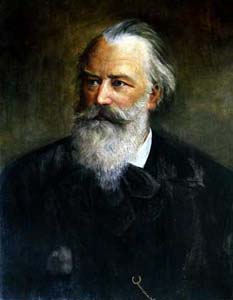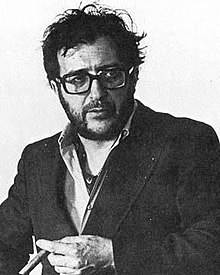
Riccardo Chailly is an Italian conductor.
The Gramophone Classical Music Awards, launched in 1977, are one of the most significant honours bestowed on recordings in the classical record industry. They are often viewed as equivalent to or surpassing the American Grammy award, and referred to as the Oscars for classical music. They are widely regarded as the most influential and prestigious classical music awards in the world. According to Matthew Owen, national sales manager for Harmonia Mundi USA, "ultimately it is the classical award, especially worldwide."

The Clarinet Sonatas, Op. 120, Nos. 1 and 2, are a pair of works written for clarinet and piano by the Romantic composer Johannes Brahms. They were written in 1894 and are dedicated to the clarinetist Richard Mühlfeld. The sonatas stem from a period late in Brahms's life where he “discovered” the beauty of the sound and tonal colour of the clarinet. The form of the clarinet sonata was largely undeveloped until after the completion of these sonatas, after which the combination of clarinet and piano was more readily used in composers’ new works. These were the last chamber pieces Brahms wrote before his death and are considered two of the great masterpieces in the clarinet repertoire. Brahms also produced a frequently performed transcription of these works for viola with alterations to better suit the instrument.
The viola sonata is a sonata for viola, sometimes with other instruments, usually piano. The earliest viola sonatas are difficult to date for a number of reasons:
Richard Goode is an American classical pianist who is especially known for his interpretations of Mozart and Beethoven.
Rivka Golani is an Israeli viola player. She has performed as soloist with many orchestras throughout the world including the Boston Symphony, Calgary Philharmonic, Royal Concertgebouw, BBC Symphony, BBC Philharmonic, Hong Kong Symphony, Singapore Symphony, Royal Philharmonic, Rotterdam Philharmonic, Israel Philharmonic, Tokyo Metropolitan, Montreal Symphony and the Toronto Symphony. More than 250 pieces have been written for her, including over 60 concertos. The BBC Music Magazine included her in its list of the 200 most important instrumentalists and the five most important violists currently concertizing.
Lillian Fuchs was an American violist, teacher and composer. She is considered to be among the finest instrumentalists of her time. She came from a musical family, and her brothers, Joseph Fuchs, a violinist, and Harry Fuchs, a cellist, performed with her on various recordings.
Walter, Knight Boeykens was a Belgian conductor and a world-renowned clarinetist. Boeykens' impressive discography, including several critically acclaimed performances, are testimony to his status as one of the most notable clarinetists of the 20th century. Boeykens remained active and was in concert frequently all around the world until his death in 2013.

Sinfonia (Symphony) is a composition by the Italian composer Luciano Berio which was commissioned by the New York Philharmonic for its 125th anniversary. Composed in 1968–69 for orchestra and eight amplified voices, it is a musically innovative post-serial classical work, with multiple vocalists commenting about musical topics as the piece twists and turns through a seemingly neurotic journey of quotations and dissonant passages. The eight voices are not used in a traditional classical way; they frequently do not sing at all, but speak, whisper and shout words by Claude Lévi-Strauss, whose Le cru et le cuit provides much of the text, excerpts from Samuel Beckett's novel The Unnamable, instructions from the scores of Gustav Mahler and other writings.
The Diapason d'Or is a recommendation of outstanding (mostly) classical music recordings given by reviewers of Diapason magazine in France, broadly equivalent to "Editor's Choice", "Disc of the Month" in the British Gramophone magazine.

Todd Levy is an American classical clarinetist.
Wolfgang Meyer was a German clarinetist and professor of clarinet at the Musikhochschule Karlsruhe. He worked internationally as a soloist, in chamber music ensembles, and in jazz, with a repertoire from early music played on historical instruments to world premieres.
Michele Zukovsky is an American clarinetist and longest serving female woodwind player in the history of the Los Angeles Philharmonic Orchestra, serving from 1961 at the age of 18 until her retirement on December 20, 2015.

Yona Ettlinger was a clarinetist who played and taught in Israel, France and England. Ettlinger is considered a prominent classical clarinetist of his generation, and one of Israel's notable instrumentalists. His musicianship and unique sound influenced the art of clarinet playing in Israel and Europe in the second half of the 20th century. Many clarinet soloists and orchestra players of different countries were among his students.
Teresa Procaccini is an Italian composer and music educator.
Igor Zubkovsky is a Russian cellist.
A Garland for Dr. K. is a set of eleven short compositions created in 1969 for the celebration of the eightieth birthday of Dr Alfred Kalmus, the director of the London branch of Universal Edition. It is also the title of an album containing these eleven pieces of music, recorded in 1976.

Quattro versioni originali della "Ritirata notturna di Madrid" is an arrangement by Luciano Berio of a movement from Luigi Boccherini's Musica notturna delle strade di Madrid. The full title of the composition is Quattro versioni originali della "Ritirata notturna di Madrid" di Luigi Boccherini, sovrapposte e transcritte per orchestra. This arrangement was composed in 1975.

The Modification and Instrumentation of a Famous Hornpipe as a Merry and Altogether Sincere Homage to Uncle Alfred, sometimes shortened to Hornpipe, is an arrangement for six players of Henry Purcell's Hornpipe, from The Fairy-Queen, by Italian composer Luciano Berio. This arrangement was composed in 1969.





